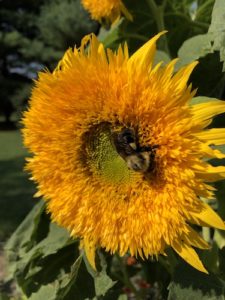Pollinator Decline Identified as Potential Global Risk
Disappearing habitats and widespread use of pesticides are contributing to the loss of pollinator species globally and posing a threat to ecosystem services that ensure crop productivity and provide food to billions of people. This is the conclusion of an expert panel led by the University of Cambridge who used available scientific information to track this issue. Bees, butterflies, wasps, beetles, bats, flies, and hummingbirds naturally distribute pollen which is vital for over 75% of current food crops and flowering plants, including most fruits and vegetables as well as coffee. Pollinator populations are declining worldwide with little understanding of the effects on the food supply and the consequences for humans. The top three reasons for pollinator loss are habitat destruction, agricultural land management practices, and pesticide use. A fourth factor may be climate change, but data is too limited to quantify. The pollination deficit is believed to negatively impact the quantity and quality of crop production.
Monitor trends with our Regulatory Trends AI-based monitoring tool.

Picture Credit Susanne Kuehne
Posted on 15 September 2021
